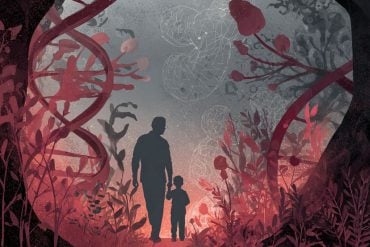Summary: Young children with older sisters have better language skills than those with older brothers.
Source: CNRS
Intuitively, it is tempting to think that a child who has an elder brother or sister will grow up in a stimulating linguistic environment and will develop their language skills faster than the family’s firstborn. However, several studies have shown the contrary: the acquisition of language in a child with an elder sibling is reported to be slower than a child who has none.
What is even more surprising is that apparently only elder brothers impact the language skills of their younger siblings, as a study conducted by a research team from the CNRS, the AP-HP, the EHESS, the ENS and the INSERM has just shown. The study finds that children who have grown up with an elder sister have identical development to children with no elder sibling.
More than 1000 children have been followed from birth to five and a half years old in the mother-child cohort EDEN*. Their language skills were evaluated at 2, 3 and 5.5 years old by tests measuring several aspects of language, such as vocabulary, syntax and verbal reasoning. Children who have an elder brother had on average a two-month delay in language development compared with children with an elder sister.

The scientists propose two hypotheses that may explain this result. The first is that elder sisters, in being more willing to talk to their younger siblings than brothers, may compensate for their parents being less available. Another hypothesis would be that elder sisters compete less than elder brothers for parental attention.
Though this study cannot separate these two hypotheses, it does show that early language development in a younger sibling tends to be slower when the elder is a boy. For their next project, the scientists want to examine the impact of culture (specifically geographical origin) on these results.
*- The EDEN cohort recruited families between 2003 and 2006 in the CHU in Nancy and Poitiers.
Source:
CNRS
Media Contacts:
Francois Maginiot – CNRS
Image Source:
The image is in the public domain.
Original Research: Closed access
“The Effect of Older Siblings on Language Development as a Function of Age Difference and Sex”. Naomi Havron et al.
Psychological Science doi:10.1177/0956797619861436
Abstract
The Effect of Older Siblings on Language Development as a Function of Age Difference and Sex
The number of older siblings a child has is negatively correlated with the child’s verbal skills, perhaps because of competition for parents’ attention. In the current study, we examined the role of siblings’ sex and age gap as moderating factors, reasoning that they affect older siblings’ tendency to compensate for reduced parental attention. We hypothesized that children with an older sister have better language abilities than children with an older brother, especially when there is a large age gap between the two siblings. We reanalyzed data from the EDEN cohort (N = 1,154) and found that children with an older sister had better language skills than those with an older brother. Contrary to predictions, results showed that the age gap between siblings was not associated with language skills and did not interact with sex. Results suggest that the negative effect of older siblings on language development may be entirely due to the role of older brothers. Our findings invite further research on the mechanisms involved in this effect.






